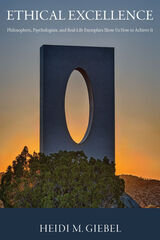
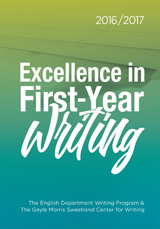
Every day, students at the University of Michigan work hard to develop their skills as writers. Every winter, we have a chance to sample the fruits of this labor as we select winners for the first-year writing prize. The English Department Writing Program and the Sweetland Center for Writing established a first-year writing prize in 2010. With generous support from the Sweetland Center for Writing, Andrew Feinberg and Stacia Smith (both of whom earned English degrees from the University of Michigan), and the Granader Family, we have developed a tradition of honoring students who produce writing of exceptional quality.
In this collection, we share the writing of prize-winning students so that other writers may learn from, and feel inspired by, their examples. The featured essays illustrate how writers formulate compelling questions, engage in dialogue with other thinkers, incorporate persuasive and illuminating evidence, express powerful and poetic insights, and participate in meaningful conversations.
We are equally grateful to the many students who submitted essays for these writing prizes and the many instructors who encouraged and supported them. As writing teachers, we relish the opportunity to learn from the challenging questions, intellectual energy, creativity, and dedication that our students and their teachers bring to our classrooms. We hope that you will gain as much pleasure as we have from reading the writing contained in this volume.

Every day, students at the University of Michigan work hard to develop their skills as writers. Every winter, we have a chance to sample the fruits of this labor as we select winners for the first-year writing prize. The English Department Writing Program and the Sweetland Center for Writing established a first-year writing prize in 2010. With generous support from the Sweetland Center for Writing, Andrew Feinberg and Stacia Smith (both of whom earned English degrees from the University of Michigan), and the Granader Family, we have developed a tradition of honoring students who produce writing of exceptional quality.
In this collection, we share the writing of prize-winning students so that other writers may learn from, and feel inspired by, their examples. The featured essays illustrate how writers formulate compelling questions, engage in dialogue with other thinkers, incorporate persuasive and illuminating evidence, express powerful and poetic insights, and participate in meaningful conversations.
We are equally grateful to the many students who submitted essays for these writing prizes and the many instructors who encouraged and supported them. As writing teachers, we relish the opportunity to learn from the challenging questions, intellectual energy, creativity, and dedication that our students and their teachers bring to our classrooms. We hope that you will gain as much pleasure as we have from reading the writing contained in this volume.
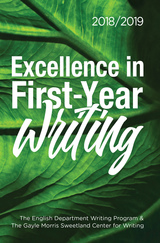
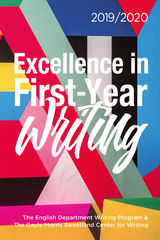
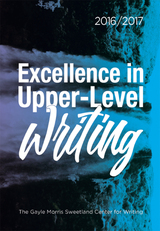
Ask any professional, business person, or employer about one of the most important qualifications for college-educated workers, and the answer will be nearly universal: the ability to write well. The Upper-Level Writing Requirement (ULWR) was established to enable undergraduates in the College of Literature, Science, and the Arts to develop their capacities as writers. Originally designed in 1978 to help students “understand and communicate effectively the central concepts, approaches, and materials of their discipline,” the ULWR supports a slightly different goal in today’s more interdisciplinary context. A significant percentage of students now have more than one major or fulfill the ULWR outside of their majors. Likewise, many faculty members are increasingly concerned with preparing students to write for various professional and public audiences as well as for discipline-based ones. However, whether students fulfill the ULWR within or outside of their majors or write for audiences within or outside of the academy, they are held to the same standards of effective writing.
This collection demonstrates the continuing value of the ULWR. Courses like the ones in which students produced these essays create contexts where students meet the expectations of the ULWR and can push beyond them to an even more impressive level of accomplishment. While the specifics of what counts as evidence and how one makes a convincing argument vary across the essays included here, each one embodies qualities that mark effective writing. The authors deal with a wide variety of topics, but in every case they combine deep understanding of a specific area with excellent prose. They take risks and adhere to conventions; they synthesize complex ideas and provide rich detail; they exert intellectual independence and respect disciplinary conventions, from creative nonfiction in the humanities to empirical research in the sciences.
We have been honoring students for outstanding writing in ULWR courses since 2010, but since 2014, thanks to a generous gift from the Granader Family, the prizes are more substantial. We are grateful to the Granaders for choosing to recognize student writing in this way. This collection is another form of recognition for the award-winning students. By publishing this student writing both online and in hard copy we make it available as a model and as a source of inspiration for others.
Talented and committed as they are, these students represented here did not become award-winners entirely on their own. Each of them benefited from well-designed assignments, careful reading, and suggestions for revision from the instructors who nominated them. The instructors’ introductions for each selection provide a window into student learning as well as into the specific dimensions of each student’s achievements.

Ask any professional, business person, or employer about one of the most important qualifications for college-educated workers, and the answer will be nearly universal: the ability to write well. The Upper-Level Writing Requirement (ULWR) was established to enable undergraduates in the College of Literature, Science, and the Arts to develop their capacities as writers. Originally designed in 1978 to help students "understand and communicate effectively the central concepts, approaches, and materials of their discipline," the ULWR supports a slightly different goal in today's more interdisciplinary context. A significant percentage of students now have more than one major or fulfill the ULWR outside of their majors. Likewise, many faculty members are increasingly concerned with preparing students to write for various professional and public audiences as well as for discipline-based ones. However, whether students fulfill the ULWR within or outside of their majors or write for audiences within or outside of the academy, they are held to the same standards of effective writing.
This collection demonstrates the continuing value of the ULWR. Courses like the ones in which students produced these essays create contexts where students meet the expectations of the ULWR and can push beyond them to an even more impressive level of accomplishment. While the specifics of what counts as evidence and how one makes a convincing argument vary across the essays included here, each one embodies qualities that mark effective writing. The authors deal with a wide variety of topics, but in every case they combine deep understanding of a specific area with excellent prose. They take risks and adhere to conventions; they synthesize complex ideas and provide rich detail; they exert intellectual independence and respect disciplinary conventions, from creative nonfiction in the humanities to empirical research in the sciences.
We have been honoring students for outstanding writing in ULWR courses since 2010, but since 2014, thanks to a generous gift from the Granader Family, the prizes are more substantial. We are grateful to the Granaders for choosing to recognize student writing in this way. This collection is another form of recognition for the award-winning students. By publishing this student writing both online and in hard copy we make it available as a model and as a source of inspiration for others.
Talented and committed as they are, these students represented here did not become award-winners entirely on their own. Each of them benefited from well-designed assignments, careful reading, and suggestions for revision from the instructors who nominated them. The instructors' introductions for each selection provide a window into student learning as well as into the specific dimensions of each student's achievements.
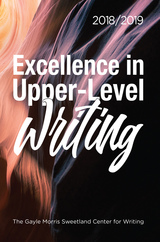
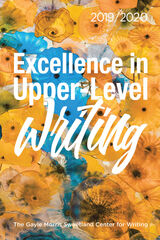
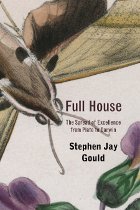
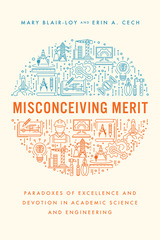
In Misconceiving Merit, sociologists Mary Blair-Loy and Erin A. Cech uncover the cultural foundations of a paradox. On one hand, academic science, engineering, and math revere meritocracy, a system that recognizes and rewards those with the greatest talent and dedication. At the same time, women and some racial and sexual minorities remain underrepresented and often feel unwelcome and devalued in STEM. How can academic science, which so highly values meritocracy and objectivity, produce these unequal outcomes?
Blair-Loy and Cech studied more than five hundred STEM professors at a top research university to reveal how unequal and unfair outcomes can emerge alongside commitments to objectivity and excellence. The authors find that academic STEM harbors dominant cultural beliefs that not only perpetuate the mistreatment of scientists from underrepresented groups but hinder innovation. Underrepresented groups are often seen as less fully embodying merit compared to equally productive white and Asian heterosexual men, and the negative consequences of this misjudgment persist regardless of professors’ actual academic productivity. Misconceiving Merit is filled with insights for higher education administrators working toward greater equity as well as for scientists and engineers striving to change entrenched patterns of inequality in STEM.
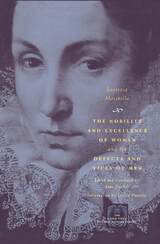
Marinella's masterpiece, The Nobility and Excellence of Women, and the Defects and Vices of Men was first published in 1600, composed at a furious pace in answer to Giusepe Passi's diatribe about women's alleged defects. This polemic displays Marinella's vast knowledge of the Italian poetic tradition and demonstrates her ability to argue against authors of the misogynist tradition from Boccaccio to Torquato Tasso. Trying to effect real social change, Marinella argued that morally, intellectually, and in many other ways, women are superior to men.

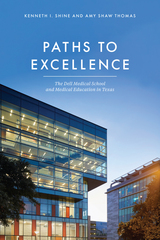
This book tells in detail and for the first time the story of how this change came about: how dedicated administrators, alumni, business leaders, community organizers, doctors, legislators, professors, and researchers joined forces, overcame considerable resistance, and raised the funds to build a new medical school without any direct state monies. Funding was secured in large part by the unique willingness of the local community to tax itself to pay for the financial operations of the school. Kenneth I. Shine and Amy Shaw Thomas, who witnessed this process from their unique vantages as past and present vice chancellors for health affairs in the University of Texas System, offer a working model that will enable other leaders to more effectively seek solutions, avoid pitfalls, and build for the future.
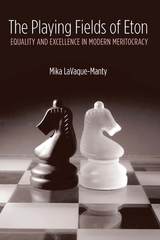
"Beautifully written and brilliantly argued, The Playing Fields of Eton takes us on a three-century tour of modern mental and physical life. We visit gymnasiums and dueling fields, murderball courts and Olympic venues, and while immersed in thought-provoking stories of people wrestling with the twin pursuit of equality and excellence, we find ourselves learning what it might mean to be modern. With equal measures of erudition and gentle humor, Mika LaVaque-Manty convincingly refutes the view that egalitarian progress forecloses possibilities for human excellence."
---Elisabeth Ellis, Texas A&M University
"A very insightful and clearly written philosophical inquiry into the nature of sport."
---Marion Smiley, Brandeis University
"A marvelously original analysis of the tensions---and interdependence---between equality and excellence in modern political life. From eighteenth-century dueling to contemporary doping in sports, LaVaque-Manty illuminates the bodily life of democracy at play, and challenges us to think in new ways about the connections between achievement and autonomy. The Playing Fields of Eton is an important book that pushes liberal and democratic theory in fruitful new directions."
---Sharon Krause, Brown University
Can equality and excellence coexist? If we assert that no person stands above the rest, can we encourage and acknowledge athletic, artistic, and intellectual achievements? Perhaps equality should merely mean equality of opportunity. But then how can society reconcile inherent differences between men and women, the strong and the weak, the able-bodied and the disabled?
In The Playing Fields of Eton, Mika LaVaque-Manty addresses questions that have troubled philosophers, reformers, and thoughtful citizens for more than two centuries. Drawing upon examples from the eighteenth-century debate over dueling as a gentleman's prerogative to recent controversies over athletes' use of performance-enhancing drugs, LaVaque-Manty shows that societies have repeatedly redefined equality and excellence. One constant remains, however: sports provide an arena for working out tensions between these two ideals.
Just as in sports where athletes are sorted by age, sex, and professional status, in modern democratic society excellence has meaning only in the context of comparisons among individuals who are, theoretically, equals. LaVaque-Manty's argument will engage philosophers, and his inviting prose and use of familiar illustrations will welcome nonphilosophers to join the conversation.
Mika LaVaque-Manty is Associate Professor of Political Science at the University of Michigan.

Chester Pierce was born in 1927; by 1952 he was a graduate of the Harvard Medical School. He went on to become president of the American Board of Psychiatry and Neurology and president of the American Orthopsychiatric Association. He was elected to the Institute of Medicine at the National Academy of Sciences and had an annual research seminar named after him by the National Medical Association.
Founding chair of the Black Psychiatrists of America, Pierce has profoundly affected American psychiatry and the thinking of African American psychiatrists during the last two decades. While recognized for his substantive scholarship on coping with extreme environments such as the South Pole, he is probably best known for his theories regarding how blacks cope with racism in the United States.
In Race and Excellence, Ezra Griffith, also an African American professor of psychiatry, engages Pierce in a dialogue with the goal of clarifying the inter-connection between the personal and the professional in the lives of both black scholars. The text melds the story of Pierce's life and his achievements, with particular attention to his theories about the predictable nature of racist behavior and the responses of oppressed groups. Having earned his doctorate a generation after Pierce, Griffith approaches his conversation with Pierce as a face-to-face meeting between mentor and student. Retelling Pierce's life story ultimately becomes for Griffith an exercise in conceptualizing his own experience. As he writes, “I never just wanted to tell Chet's story; I wanted to work his story out, to measure it, to try it on, to figure out which parts are good for me and other blacks so earnestly seeking heroes.”
READERS
Browse our collection.
PUBLISHERS
See BiblioVault's publisher services.
STUDENT SERVICES
Files for college accessibility offices.
UChicago Accessibility Resources
home | accessibility | search | about | contact us
BiblioVault ® 2001 - 2024
The University of Chicago Press









